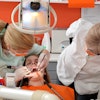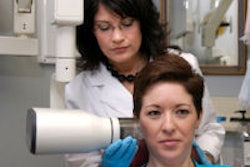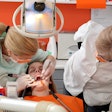
Dental assistants and hygienists in Iowa may be allowed to perform additional expanded functions proposed by the Iowa Dental Association (IDA) pending state approval.
The Iowa Dental Board held a meeting on July 13, 2012, to explore this possibility. The discussion involved additional expanded functions for dental assistants and hygienists in five areas proposed by the IDA.
Meeting participants included the IDA, the Iowa Dental Hygienists' Association (IDHA), the Iowa Academy of General Dentistry (IAGD), and other interested parties, including the University of Iowa College of Dentistry and several Iowa community colleges.
The IDA is proposing the following expanded functions for hygienists and dental assistants:
- Removal of adhesives
- Placement and shaping of amalgam and composite restorative material
- Forming and placement of stainless steel crowns
- Taking final impressions and records for fabrication of dentures
- Cementation of final restorations
Larry Carl, executive director of the IDA, told DrBicuspid.com that the whole consideration was initiated by dental hygienists.
“The access-to-care issue prompted the hygienists to ask for expanded functions.”
— Larry Carl, executive director, Iowa
Dental Association
"There are a significant number of hygienists in the state who are unemployed or underemployed," Carl said. "The dental hygienists petitioned the state to allow them to perform expanded functions."
The IDA then approached the board and said that if the board will consider allowing hygienists to perform expanded functions, they should also consider expanding the list of functions for dental assistants.
Existing functions
Dental assistants in Iowa can already be designated to perform some expanded functions, Carl explained. According to the Iowa Dental Board, "a dentist may delegate an expanded function duty to a registered dental assistant if the assistant has completed board-approved training ... in the specific expanded function that will be delegated."
Some of the current expanded functions dental assistants are allowed to perform:
- Taking occlusal registrations
- Placing and removing gingival retraction
- Taking final impressions
- Fabricating and removing provisional restorations
- Applying cavity liners and bases, desensitizing agents, and bonding systems
- Placing and removing dry socket medication
- Placing periodontal dressings
- Testing pulp vitality
- Monitoring nitrous oxide
At the July meeting, the board took up the issue in a combined setting, including both assistants and hygienists.
"The access-to-care issue prompted the hygienists to ask for expanded functions," Carl said. "Adding these additional functions could increase the reach of Iowa dentists."
This could be particularly important because many additional adults and children in Iowa could soon have oral health benefits due to the Affordable Care Act (ACA), he added.
"The Iowa Medicaid estimates that 150,000 Iowans could have new dental benefits starting in 2014 because of the ACA," Carl said.
According to Carl, all of the organizations present at the meeting appeared to be on board with the proposed additional functions.
"That doesn't mean there aren't individuals who disagree with allowing hygienists and assistants to perform some or all of these additional expanded functions," he clarified.
Direct supervision
Iowa currently requires that for each dental assistant who will be performing expanded functions the dental office of practice maintain documentation of training and provide direct supervision. Direct supervision means the dentist has delegated the task and is present in the treatment facility.
The new functions being proposed by the IDA will only be allowed under the supervision of a dentist, but the level of the supervision had not been decided yet, Carl noted.
"My guess is that it will be direct supervision," he said.
Steven Thies, DDS, the IAGD legislative chair who attended the meeting, said in a press release, "there were numerous comments stating that access to care is not an access problem but rather a utilization problem, and I questioned the financial viability of expanded functions for providers providing treatment for Medicaid recipients due to the extremely low fees of the Medicaid program."
The dental board has taken all the information under advisement and will consider the proposal at a meeting in October, Carl concluded.



















